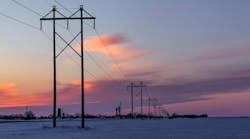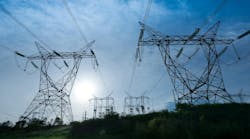Lone Star Transmission, LLC, a subsidiary of FPL Energy, LLC, filed an application with the Public Utility Commission of Texas (PUC) for a Certificate of Convenience and Necessity to establish a new regulated utility business unit to construct, own and operate transmission facilities in Texas. If approved, the project will provide much needed power for the growing Dallas/Fort Worth metroplex and other regions throughout Texas.
Under its plan, Lone Star Transmission will build, own and operate a 180-200 mile, high voltage, direct current, open access transmission line to bring renewable energy resources from West Texas to the Dallas/Fort Worth area. Dubbed the “DFW Express,” the new transmission line would be constructed with a capacity of 2,000 MW and stretch from near Abilene to the Dallas/Fort Worth load center.
“Our proposal to build the DFW Express will enhance the ability to transmit power from West to North Texas and enable continued large-scale development of emission-free wind power in West Texas,” said Mitch Davidson, president of FPL Energy. “The DFW Express proposal will help serve the growing energy needs in the Dallas/Fort Worth load center, while at the same time, minimizing the existing transmission congestion between the regions.”
Texas State Senator Troy Fraser said, “I have long supported the building of transmission and new generation in West Texas, and the DFW Express is a critical first step in ensuring that the state will meet its long-term power needs. I am particularly pleased that FPL Energy is proposing to utilize this innovative technology which will bring more clean, affordable power directly from West Texas to the Dallas/Fort Worth area while maximizing efficiency and minimizing the impact of transmission lines on landowners.”
Texas State Representative Susan King said, “Texans need new, clean power generation resources to meet growing energy demand, and West Texas is an ideal area for growth. The DFW Express proposal, if approved by the Texas PUC, positions West Texas for significant economic development from clean and renewable wind power. The project will create new jobs and add hundreds of millions of dollars of infrastructure in the region.”
Texas State Representative Marc Veasey said, “The DFW Express proposal, if approved, will bring the Dallas/Fort Worth area significant amounts of emission-free power, thereby enhancing air quality in the region. Although wind power and the DFW Express proposal cannot solve all of our power generation and air quality issues, it can certainly be part of the solution. In addition to the obvious environmental benefits this project will bring, it will also generate a significant amount of new tax revenues for our schools.”
Opening up West Texas to continued wind development through the proposed DFW Express will lead to billions of dollars in capital investments and significant economic development activity throughout the region. In addition, the Electric Reliability Council of Texas will benefit from thousands of additional megawatts of generation capacity. Wind farms can be constructed in a much shorter timeframe than traditional fossil or solid fuel plants, and wind farms have no negative impacts to air or water quality.
High voltage direct current technology offers a number of benefits over high voltage alternating current technology including:
- The power flow is controllable – power is injected when needed;
- Congestion of the existing West Texas 69-kV, 138-kV and 345-kV systems is bypassed; and
- More power will be delivered with fewer, less expensive lines utilizing a much narrower land corridor than a comparable alternating current structure carrying equivalent energy.
The cost of the DFW Express is expected to be in the range of $635 million to $655 million, and Lone Star Transmission believes the transmission line can be constructed in less than three years from the date a Certificate of Convenience and Necessity for the facility is approved by the Texas PUC.
Lone Star Transmission submitted the DFW Express proposal for consideration after reviewing transmission proposals put forth by other parties in the CREZ docket such as the Panhandle Loop Interveners and Electric Transmission Texas.
“The DFW Express proposal is not only innovative in its approach but also flexible enough to compliment the other transmission proposals or work as a stand-alone project,” said Davidson. “The interest shown by FPL Energy and numerous parties to construct transmission facilities in Texas will benefit Texas ratepayers by introducing competition among the various proposals to provide the most cost-effective regional transmission solution.”
With more than 70,000 miles of transmission and distribution facilities in Florida, California and the Northeast, FPL Energy and its affiliated companies have extensive experience and expertise in this field.

